The Newman Civic Fellow Conference
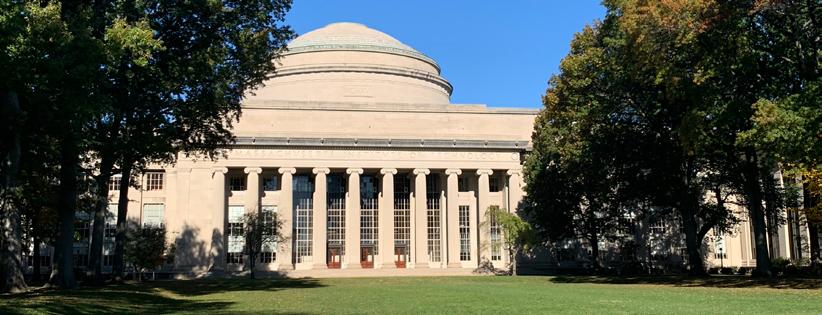
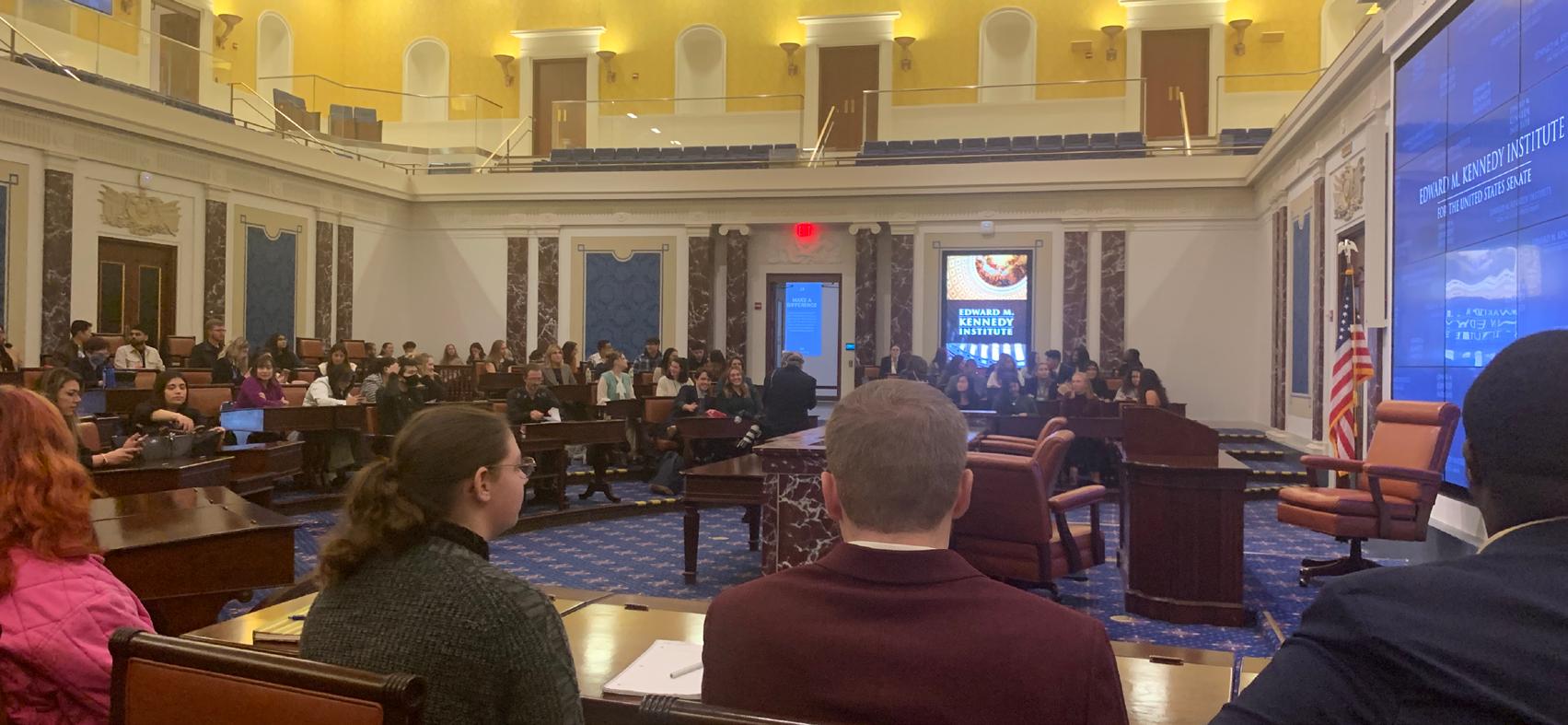


 by Amogh Bandekar ‘23
by Amogh Bandekar ‘23
“Is that NOLS beanie about the outdoor leadership school in Wyoming?” the passenger on the plane sitting next to me asked, referring to the branded beanie on my head. I was pleasantly surprised, since I assumed few people knew about the National Outdoor Leadership School, and even fewer people would know about it on a flight to Boston. While this individual had not participated in a NOLS program, he had been to the rural town in Wyoming named Lander where every first-year Levine embarks on a backpacking adventure in the summer before starting college. We shared stories, including mine of how a bear entered our camp and we managed to scare it away. I took this conversation as a good omen for the start of my busy weekend. Once I landed in Boston, I had a few hours to get situated and meet the other Newman Civic Fellows prior to the first day of the conference in the Edward M. Kennedy Institute for the U.S. Senate.
Upon arriving at the Edward M. Kennedy Institute for the U.S. Senate, I was blown away. The venue is a fullscale replica of the United States Senate Chamber in Washington D.C.. While I previously had the privilege of seeing the actual chamber, I had an entirely different experience in Boston. I had more freedom to walk and observe the architecture of the replica building. As a part of the senator-for-a-day experience, each of the Newman Civic Fellows were given a name slab that had their name written with the title of senator followed by their home state below. Following this we were presented with a variety of social issues and tasked to advocate on the behalf of our representative states on bills being presented on the senate floor.
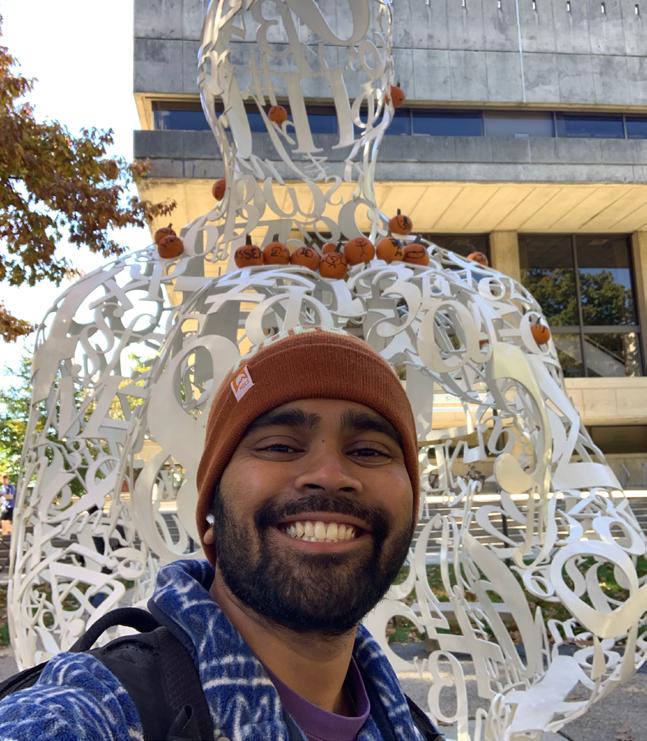
Spring 2023 Volume 14 Edition 1
Levine Connection
“ “
Being able to attend the Newman Civic Fellows Conference was a transformative experience. I left Boston feeling energized and empowered, and I am grateful for the opportunity to have participated in such a meaningful event as a senior through the Levine Scholars Program.
Photo captions - top: Newman Civic Fellows gather to listen to speakers. Bottom: The Great Dome serves as a library and lecture hall at MIT.
1
Bottom right: Alchemist is a sculpture by Spanish sculptor Jaume Piensa.
One of the most impactful parts of the first day of the conference was the keynote speaker, Nicole Tisdale. Tisdale’s focus on national security policy which she shared through her personal journey resonated with me, and I felt inspired to continue pursuing my passion for social justice. It was a great reminder that we all have the power to create positive change in our communities. Throughout the day I was also able to meet and connect with likeminded individuals and Marshall and Truman Scholars, who were passionate about creating positive change in their communities ranging from educational policy to climate change. Hearing about their innovative initiatives and projects further supported and energized my desire to continue to be a public problem solver.
After the first day, I was amazed by the level of inspiration and drive that I was able to gather. The conference provided me with the opportunity to connect with a diverse group of student leaders from all over the country, and to learn about innovative solutions to pressing social issues. The workshops and panel discussions were led by former Senate and White House staffers and their insights were both thought-provoking and actionable. The interactive nature of the sessions allowed me to engage with my peers and exchange ideas and experiences, which was incredibly valuable. Some of the sessions I attended dealt with devising policy plans for the integration of renewable energy sources into the U.S. current energy use portfolio and creating a proposal for either universal health insurance coverage or universal basic income.
The city of Boston also played an important role in the conference. We were able to explore its history and culture and learn about the unique challenges that the community faces. This provided me with a reminder that social justice issues are not isolated to one particular community or region, and that we need to work together to create lasting change. The conference also challenged me to think critically about the issues facing our society. It echoed that there is no one-size-fits-all solution to these issues, and that we need to be creative and innovative in our approach. One of the most creative sessions at the conference was a small group discussion where we wrote a Haiku about why we choose to be public problem solvers in our communities. Hearing about the issues that my peers were most passionate about showed me that while we pursue different interests, we are all working towards the same goal. Additionally, during the evenings of the “Halloweekend,” I was able to explore the city with my peer Newman Fellows, making sure we checked off our Boston bucket list by experiencing a New England Lobster Roll, Boston Cream Pie, and participating in Halloween at Harvard and MIT.
Overall, being able to attend the Newman Civic Fellows Conference was a transformative experience. It provided me with the opportunity to connect with other student leaders across the country, to learn about innovative solutions to pressing social issues, and to put those lessons into action. I left Boston feeling energized and empowered, and I am grateful for the opportunity to have participated in such a meaningful event as a senior through the Levine Scholars Program.
“The Newman Civic Fellowship is a year-long program that recognizes and supports student public problem solvers at Campus Compact member institutions. Fellows are nominated by their president or chancellor based on their potential for public leadership and their work with communities. Throughout the fellowship year, Campus Compact provides students with opportunities to nurture their assets and help them develop strategies for social change— creating a network of connected and engaged student leaders who can support one another in making positive change.” - Compact.org


2
Immersive Art Hits the Levine Scene: A Story About Community Connections



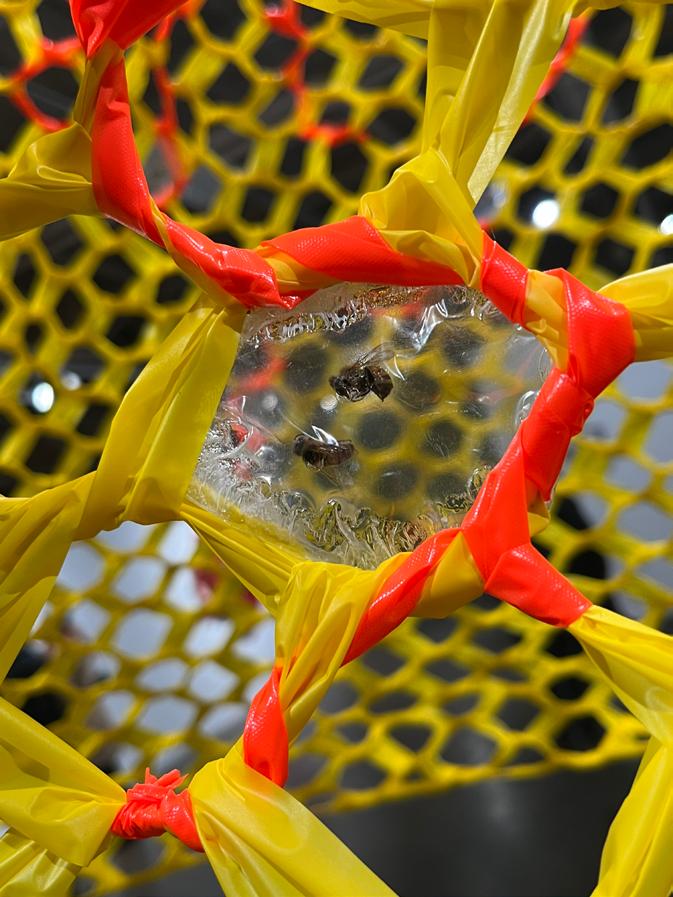 by Mia Nguyen ‘24
by Mia Nguyen ‘24
My spring semester has been full of highs, as I find my feet in the Charlotte art scene. I am a Studio Art major with a concentration in 3D Interdisciplinary Studies, and I am sure that after that mouthful of a description you are wondering what exactly I do. My focus is installation art which means I strive to create immersive, three-dimensional spaces where I quite literally invite people to walk into them. I want you to be able to interact directly with my art through touch and sight to create an experience that challenges perception.
This past February marks the first time my installation work has been showcased in art exhibitions. The two installations I had the privilege of debuting were titled Where Are Your Keys? and Honey Crash Where Are Your Keys? was selected for the Charlotte 2023 Juried Student Exhibition in the Rowe Arts Building on campus. As it happens, I didn’t even think my installation qualified for the show given its dimensions (an approximately 9 ft by 3 ft by 9 ft fabricated corridor) and because it is not a commonly submitted genre of art. It wasn’t until my sculpture professor, Thomas Schmidt, reached out to me that I entered the competition. Without his support I would have never applied and consequently never been selected. Where Are Your Keys? at its core is about accessibility. You need keys to unlock new opportunities, but what thresholds do you have to cross or break in your pursuit? What good is having a key if it’s still uncut, and how do you grapple with the understanding that you need a key yet have no idea what it looks like?
Honey Crash was selected for the “Internal Powers, External Forces” show at Goodyear Arts gallery in Camp North End. This exhibition was particularly special to me because all of the work featured was created by recent Charlotte graduates and current students. It was a true “artists supporting artists” moment, as we all came together to bring the empty gallery space to life. Honey Crash warns of the dangers that emerge from an obsession with personal productivity. Viewers are invited to step into caution-colored honeycomb frames to reflect, as they become acquainted with the dead “busy” bees enshrined within them.

3
Mia with her creation, Honey Crash
Where Are Your Keys?
Detail photo of a honeycomb frame Mia forming the frame of the hive Honey Crash on display in the Goodyear Arts Gallery
Support is the common theme that stitches together my experiences in the arts at Charlotte. Not only have I been encouraged by faculty and students in the arts, but also from Levine scholars across classes. At the opening and closing reception for Honey Crash, Levine freshmen, sophomores, juniors, seniors, and even an alum were present. In true Levine fashion, they came with thoughtful questions about the exhibit and an exciting willingness to engage directly with my art. For context, Honey Crash is a large yellow and orange beehive “cage” suspended above the ground, so people can walk up into it and get a closer look at the preserved honey bees embedded in the framework. A highlight of getting to watch people interact with my art was when a group of Levine scholars tried to see how many of them could squeeze into the hive all at once.
Being a part of the Levine Scholars Program means I have a community that I know I can count on to show up. This is exceptionally meaningful when considering installation art needs an audience to function as intended. That said, this support network extends even further as demonstrated by Levine scholars Caroline Wingerd (Class of ‘25) and Kaitlyn Gosline (Class of ‘24). While being abroad this semester, they both still took the time to virtually promote my installations as well as encourage me to continue entering my work into upcoming art competitions. I was once told by an art teacher, that in addition to people that will give you feedback, every artist needs an unconditional supporter of their artwork who builds them up no matter what. I’m not short on either as a Levine scholar.

Mister Vietnam of the Carolinas 2023
by Lucas Le ‘24
As a Vietnamese American, I haven’t always been afforded the opportunity to connect deeply with my culture and heritage. When I was presented with the chance to compete in the Mister Vietnam of the Carolinas pageant, I knew that it was an experience that would enrich my life. I was hopeful this opportunity could help me better understand the needs of my community which would enable me to address them through civic engagement initiatives. I am incredibly grateful for the experience and the opportunity to leverage the platform of Mister Vietnam to uplift and support the Vietnamese community in Charlotte and beyond.
Mister Vietnam of the Carolinas is a pageant hosted by the Vietnamese Association of Charlotte. The program gives Vietnamese American men the opportunity to connect with others who share their cultural heritage, while also providing valuable resources and professional development opportunities. The pageant began in 2017, and since then, it has been an important event for the Vietnamese American community in Charlotte.
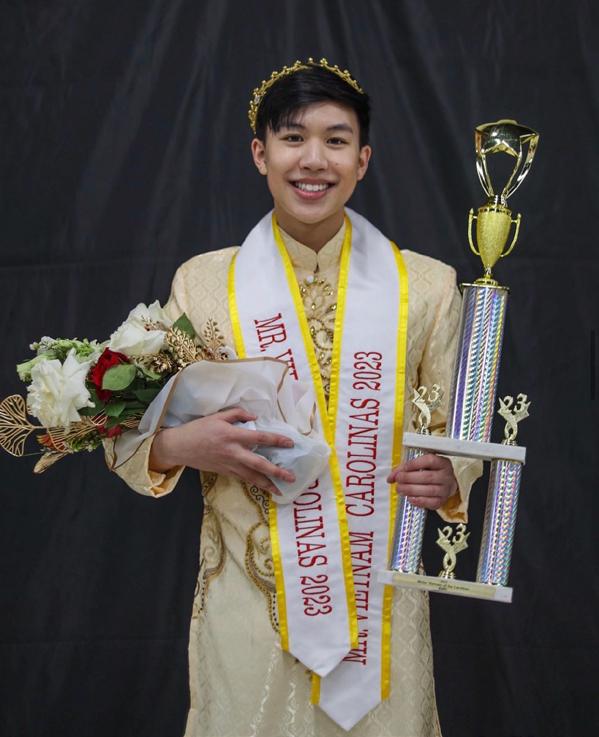
4
Levine Scholars huddle together inside the sculpture.
Lucas after being crowned Mr. Vietnam
Competing in Mister Vietnam was a holistically uplifting experience. It has been an immensely positive experience being surrounded by like-minded individuals who are ardent about celebrating and preserving our culture. Through the pageant process, I was able to connect with many Vietnamese professionals who inspire me to continue to strive for excellence in all areas of my life.
Pageant day for Mister Vietnam consists of a group dance, a suit walk, an áo dài (traditional Vietnamese clothing) walk, and a live Q&A with the judges. Pageant preparation began months in advance and practices were held to coordinate our dance and assist candidates with building confidence. During pageant practices, we participated in workshops to bring awareness to mental health and how to navigate difficult conversations with our families taking into account our cultural nuances. Various workshops also encouraged us to look inward and evaluate what we stand for. On the main stage for the Q&A, the judges asked me, “if you had one message for your younger self and the future generations, what would it be?” I hope my answer to this question persists beyond my time as Mister Vietnam: “If I had one message, it would be: you can achieve anything you set your mind to. Your culture and your heritage are great sources of strength and inspiration. And it is important to remember the hard work and sacrifices of those who came before us. Be proud of your culture. Embrace it. And use it as a launching pad and a foundation to build your own successes.” When pageant day finally came around, I was extremely excited to see my friends and family. The pageant doubles as an opportunity for the Vietnamese community to gather and celebrate the Vietnamese New Year. Seeing everyone come together and seeing so many young children embrace their culture made me optimistic about the future of our community.
As Mister Vietnam, along with the rest of the Royal Court, I look forward to attending cultural events throughout the year to increase visibility and provide a space for the community to gather and celebrate. On April 1st, 2023, I attended UNC Charlotte’s Vietnight representing Mister Vietnam. The theme of this year’s Vietnight was Lotus in Bloom, which “represents our struggles as Asian Americans growing up and coming to terms with our identity. Often we try to conform, leaving behind our cultural values. Attempting to best fit in with a society that is foreign to us and even our parents, but as we progress and start embracing our culture it allows us to fully thrive and blossom.” - UNC Charlotte Vietnamese Student Association [@unccvsa] (2023, March 31st). The night was filled with student performances, traditional lion dances, Vietnamese fan dances, and more. The event drew over five hundred attendees from all walks of life and was an amazing display of our community’s ability to come together to support one another.
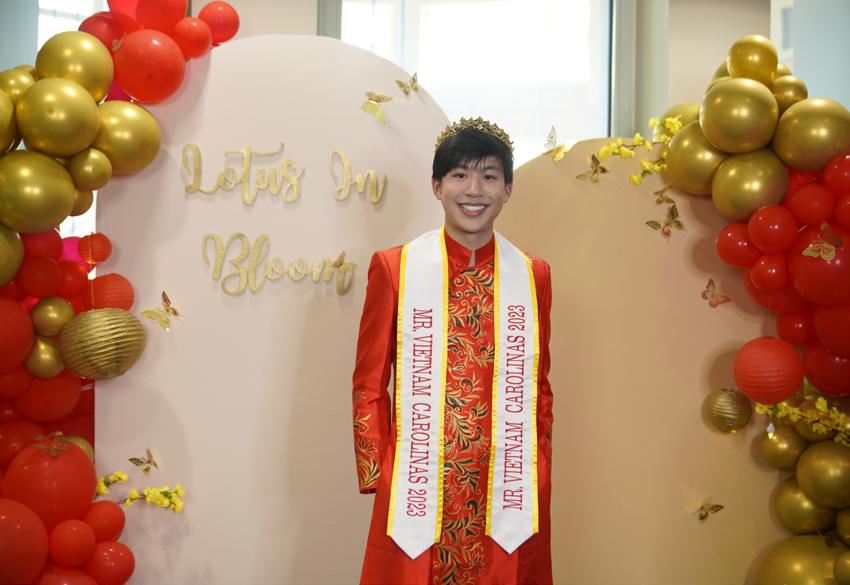
As an organization, we hope to establish workshops aimed at assisting underserved communities as well as providing opportunities for professional development and growth. Another important goal of the Royal Court is to help support the elders in our community. We intend to establish programs that help to ensure that the wisdom and knowledge of our elders are passed down to future generations.
One of my personal goals is to establish a mentorship program for young Vietnamese Americans. Growing up, I didn’t see many Vietnamese American professionals represented in the media or in my community. I want to help change that by fostering more spaces for the community to come together and embrace our culture, while also providing opportunities for mentorship and guidance.
Overall, I am incredibly grateful for the opportunity to represent my community as Mister Vietnam of the Carolinas. I believe that this platform is a powerful tool for change, and I am excited to continue working with the Vietnamese community to establish initiatives that uplift and empower those around me.
5
Vietnight’s 2023 theme was Lotus in Bloom.
Bridging the Gap: A Journey to a Healthier Campus
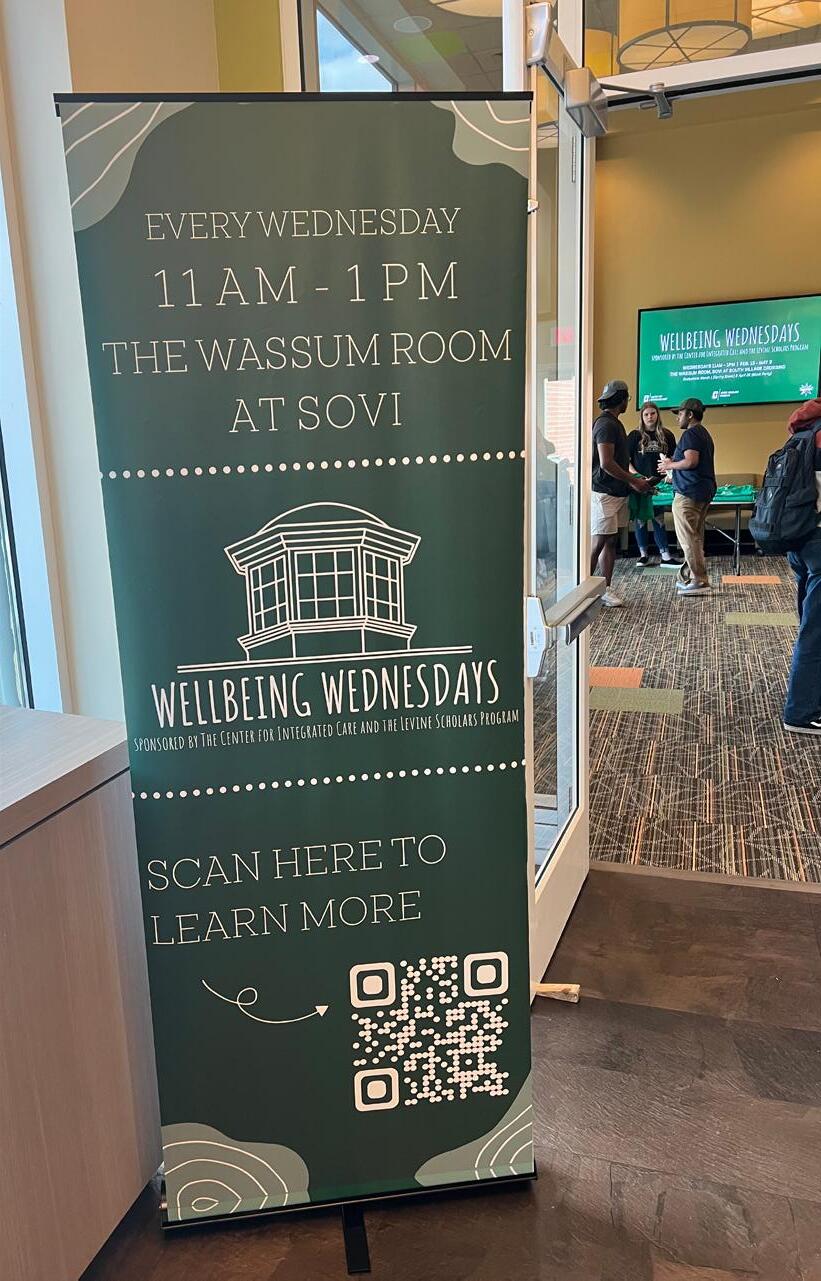 by Ariah Brown ‘23 and Cole Jones ‘23
by Ariah Brown ‘23 and Cole Jones ‘23
“How did we end up here?” is a question that has echoed in the minds of many senior scholars over the past year. As we prepare to move forward, we’ve also done a lot of looking back. Since meeting for the first time in either the Charlotte or Denver airport and spending nearly a month in the wilderness together, our class has come a long way. Acclimating to the world of college can be difficult, and we relied heavily on each other to help figure things out. LSP provides a built-in community–one that we are incredibly grateful for. Without this community, UNC Charlotte and South Village, in particular, could feel a little lonely.
As is customary to the program, all Levine Scholars live in Levine Hall for their first four semesters. Adjusting to life away from home, creating your own routine, and managing time effectively can prove to be incredibly difficult ordeals for any student, especially without proper support. During our time in Levine Hall, we noticed that it was easy to feel geographically isolated from the rest of campus. Much of what is considered “central” to campus life (the Student Union, the Recreation Center, the Light Rail, etc.) is on the opposite side of campus. More noteworthy is the ill placement of the Student Health Center and the Counseling and Psychological Services facility in relation to South Village.
Research suggests that health problems, particularly mental health problems, are more likely to arise in the first and second years of university attendance. Communal living also brings its share of new pathogens that inevitably lead to some variation of a “dorm flu.” Considering that most students living in South Village are underclassmen—the fact that it is located more than a mile from the campus Student Health Center and Counseling and Psychological Services building on foot is especially problematic. The idea for Wellbeing Wednesday was born when we realized that seeking help could be prevented by the difficulty of accessing campus health infrastructure. We also noticed a significant lack of knowledge about available resources when talking with other students. Wellbeing Wednesday provides a starting solution to these issues by bringing UNC Charlotte’s healthcare options directly to South Village.
Through a partnership with the newly formed Center for Integrated Care (CIC) on campus, we began work on the project in September of 2022 (the fall semester of our senior year). We quickly realized how much work and coordination was involved with a project spanning this many departments. All of the details varied in significance but fundamentally demonstrated to us the complexity of pulling off a project requiring the input and cooperation of so many people. Throughout the project, we found ourselves, yet again, relying on each other and the support of our LSP cohort. We’ve learned a ton about navigating the bureaucracy that is academia, and we’ve had each other to debrief with each time we were frustrated or discouraged. Thankfully, things are much less stressful on the back end, and we now get to spend two hours each week handing out t-shirts and discussing our most pressing existential questions. We had multiple hiccups along the way (as do most projects), so despite aiming to have our first official Wellbeing Wednesday in mid-January, we launched our first event on February 15, 2023. Representatives from University Recreation (UREC), Counseling and Psychological Services (CAPS), the Student Health Center (SHC), the Center for Wellness Promotion (CWP), and Dining and Nutrition Services have gathered weekly in the Wassum Room in the SoVi dining hall. We hope the event has allowed students to access information about healthcare on a route they would be traveling anyway.
6
Cole and Ariah worked with University Communications to create promotional materials
We will complete the semester having completed a total of 10 Wellbeing Wednesdays–a feat we are definitely proud of! It has been rewarding to watch students (and even some faculty) stop by and react in shock when hearing about how many workout classes UREC offers or to note their relief as they learn that there are treatments available on campus if they ever catch a cold. So far, we’ve been averaging around 100 students contacted per event, and we project that we will have reached roughly 1000 students upon completing the semester. We are hopeful that this campaign can become a legacy project for other Levine Scholars to continue after we have graduated. Perhaps the most interesting and exciting part of this project is that information collected through Wellbeing Wednesdays will be collected and used to inform the construction of a permanent student health facility in South Village (and perhaps other areas of campus). Although that is several years out, it is grounding to be a part of a project larger than us–one that will hopefully continue to serve students long after we’ve gone.
Campus Resources

The Levine Scholars Program is committed to promoting wellness and self-care to all scholars, staff, and friends of the program.

Center for Integrated Care integratedcare@charlotte.edu / cic.charlotte.edu / 704-687-1045 Location: Price Center for Counseling and Psychological Services Counseling and Psychological Center caps@charlotte.edu / caps.charlotte.edu / 704-687-0311 Location: Price Center for Counseling and Psychological Services Student Health Center studenthealth@charlotte.edu / studenthealth.charlotte.edu / 704-687-8622 Location: Student Health Center Center for Wellness Promotion wellness@charlotte.edu / wellness.charlotte.edu / 704-687-7407 Location: Student Health Center University Recreation u-rec@charlotte.edu / urec.charlotte.edu / 704-687-1385 Location: University Recreation Center Dining Services - Campus Dietician u-rec@charlotte.edu / maggie.sullivan@compass-usa.com / 704-687-6019 Location: SoVi at South Village Crossing 7
Free t-shirts drew students in to participate in Wellness Wednesdays.
Finding a Home in Rome
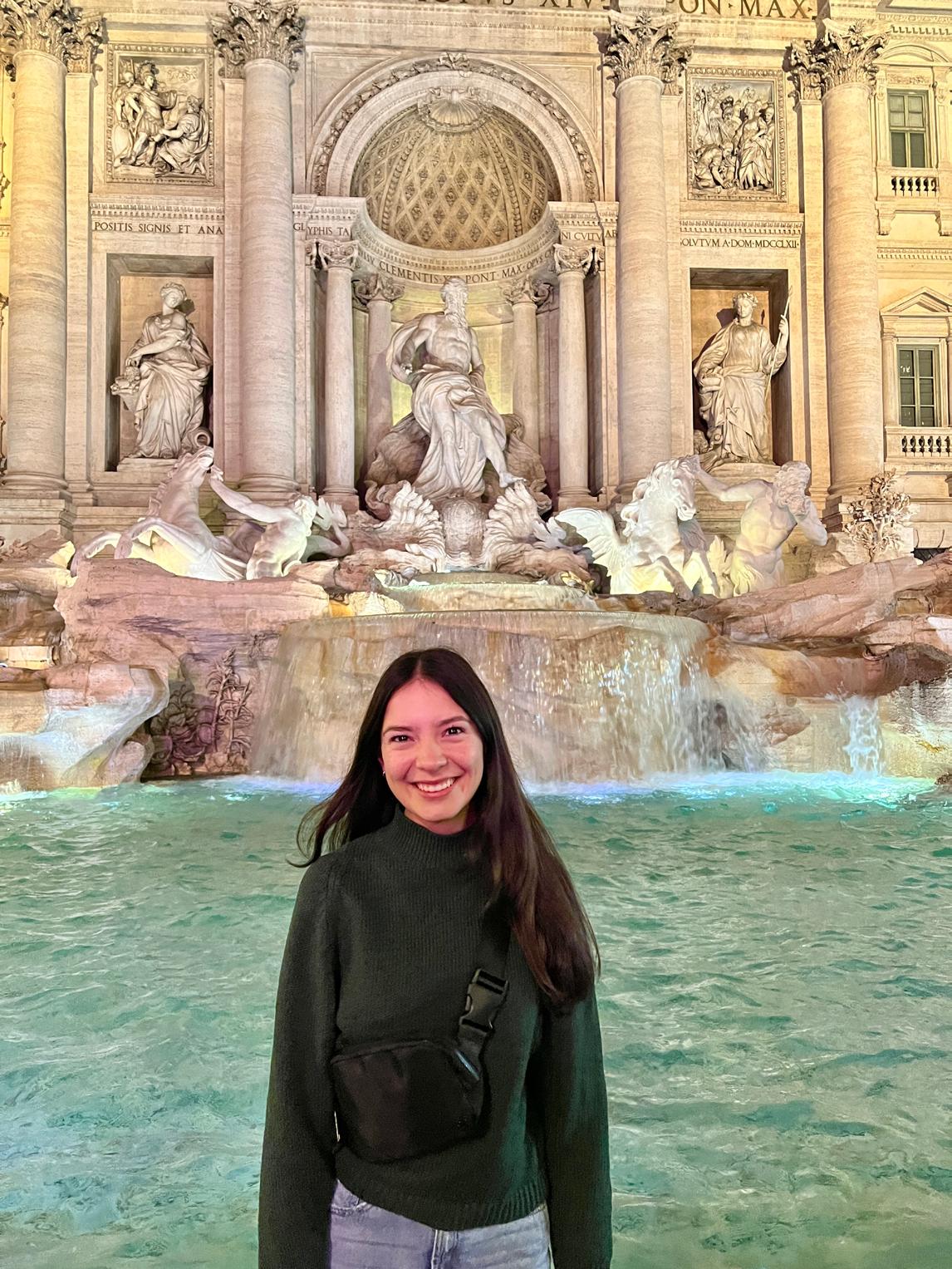 by Liliahna Bedolla ‘25
by Liliahna Bedolla ‘25
Basking in the sun on the benches outside of the Rowe arts building with my group of friends in between my accounting and calculus classes became an integral part of my freshman year. I couldn’t imagine myself being anywhere other than this campus, surrounded by anyone other than these people. It was in moments like these, under the drawn-out branches of the oak trees and amidst the large clouds of students walking past, I felt at home. Charlotte didn’t always feel like this. I vividly remember crying in my parent’s arms in Lot 8 as we said our final goodbyes, questioning if I had made a mistake. Was moving across the country from every sense of familiarity really the right decision? As days turned into weeks, the beast of 1,000 unfamiliar acres didn’t feel as daunting.
When August rolled around, and my sophomore year officially began, I decided to apply to study abroad for the Spring 2023 semester. This decision wasn’t made lightly, I felt as though I had just adjusted as an out-of-state student, and now I would be starting again at square one at a new school, an unfamiliar city, and no friends.
My hesitation and reservation were suppressed when I began looking through programs and found the American University of Rome through Campus Internationalization Solutions (CIS) Abroad. After spending countless hours scrolling through the website and looking through every photo gallery I could find, I couldn’t picture myself anywhere else. From major specific courses, a beautiful campus, and its proximity to central Rome, I was captivated.
Before I knew it, January 24th was fast approaching, and it was time to begin this new chapter. It was heartbreaking leaving my family at the airport in California. This scenario was all too familiar, it brought me back to my 17-year-old self preparing to go to NOLS. The waves of nervousness and sadness that washed over me as I flew to Rome came to an end when my new roommates (who are now some of my best friends) shared our first meal together. In typical Rome fashion, the sun’s warmth wrapped us up like a blanket, signifying an embrace to the start of something new. Adjusting to this way life took some time. To start, I created a schedule where the majority of my classes were on Monday and Wednesday, and I was done with class by 10:30am on Tuesdays and Thursdays. The amount of free time I had was intimidating, compared to the schedules I had created in Charlotte for semesters prior. However, this idle time allowed me to focus on exploring Rome. I found myself aimlessly wandering the city. From people (and dog) watching in Villa Sciarra, staring at the intricate ceilings of various basilicas, to enjoying mango gelato on the Tiber River, I felt more and more at home.
8
Visitors to Trevi Fountain in Rome throw three coins into the water in hopes that their wishes will be granted
My friends and I quickly became acquainted with the Roma Trastevere train station as it became the starting point for our weekend travels. Whether it was a day trip to the Tivoli Gardens or the FCO airport to visit other cities like Paris, Amsterdam, or Barcelona to name a few, this train station has been a dependable source of public transportation. One trip that particularly stands out is our CIS program’s overnight trip to Orvieto, Italy. During our stay, we truly embraced Italian culture by staying at an agriturismo (a style of tourism in Italy that is focused on agriculture), wine tasting at a local winery, and my personal favorite making homemade pasta noodles. Travel gave my friends and I the opportunity to build our friendship upon new experiences and cultures.
With all the excitement surrounding travel, I still found myself homesick for Charlotte. It was during this time that I decided to FaceTime Sonia Birla, who is studying in Germany, and combine these parallel feelings. We both booked flights to Dublin for the following week. While I waited outside the Chester Beatty Library for Sonia’s arrival, my anticipation was billowing. As we hugged in reunion, I couldn’t help but feel thankful for Levine for giving me a sense of home, despite being 4,800 miles away.
As I am one month shy from completing this experience, the one word that constantly comes to mind is grateful. I’m grateful for a semester of personal growth, independence, cultural awareness, unforgettable memories, and finding a home in Rome.
Vatican City is the smallest country in the world.
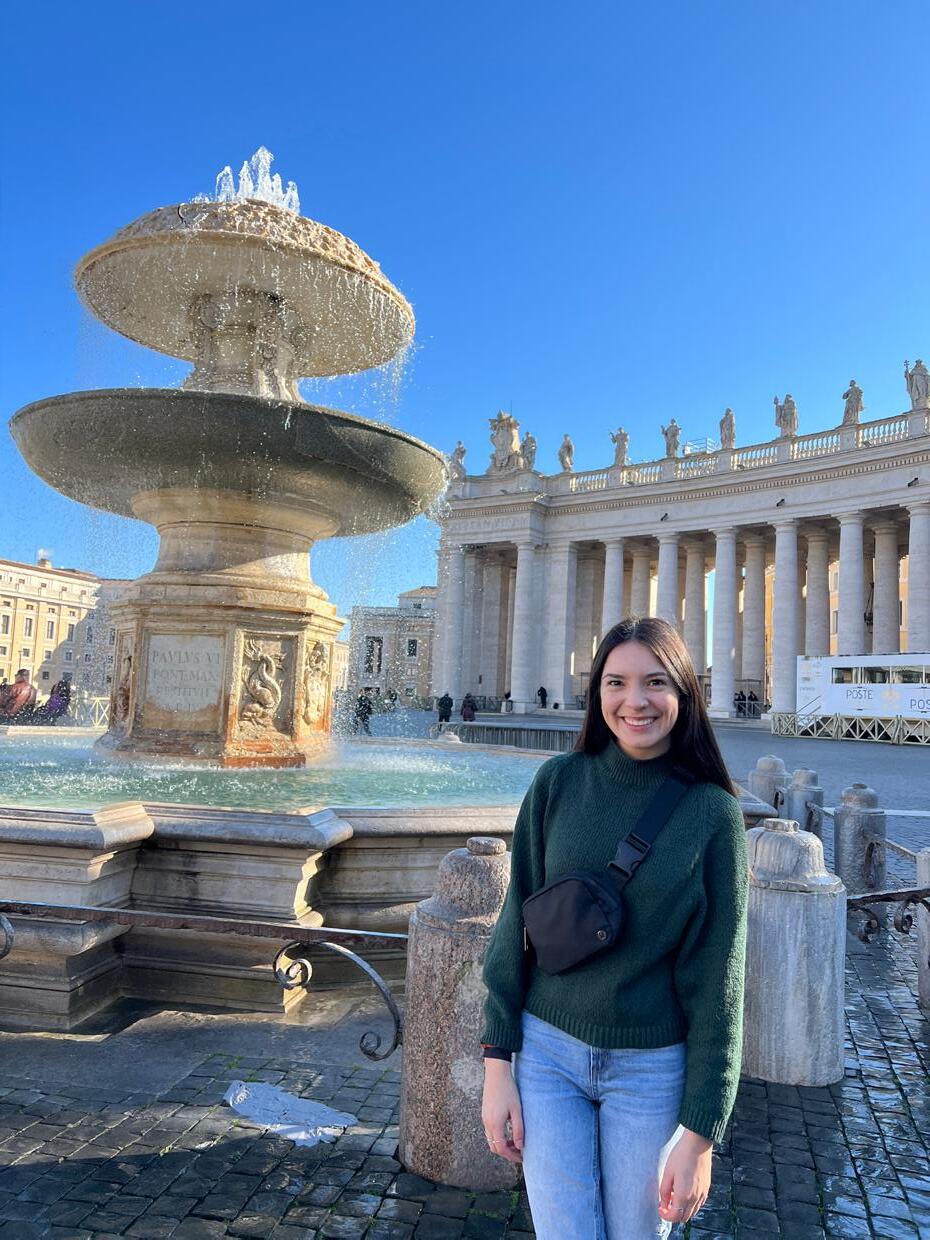
9
Sonia and Liliahna reunited during an excursion to Dublin.
Malawi: The Warm Heart of Africa
by Tyler Rapp ‘19
Once again, I return from abroad and the experience feels fake – surreal, almost – in a way. As a Levine Scholar, I had the privilege to travel abroad each summer. First, to the City of Lights in Paris, France. The month was full of art and architecture in its most beautiful form. That was my first time outside of the United States and, as a result, the most difficult to adjust to. Next, I ventured to Shanghai, China, one of the most populous cities in the world to study urbanization and its impact on health. My last summer, I went abroad once again to Stellenbosch, South Africa, to study the effects of Apartheid on the HIV/AIDS epidemic. I slowly developed a longterm interest to work in an international context. Combined with my undertakings in Dance Marathon and several other child health focused endeavors, I knew I would combine this interest with pediatric medicine. And here I am today – about to graduate from medical school at UNC and head off to residency in pediatrics at Childrens National Hospital.
In medical school, this was all further solidified by conducting research on malaria in coastal Tanzania. Unfortunately, the pandemic prevented travel to Tanzania – but this ignited my desire to travel abroad whenever it became possible. As a result, as an elective during my fourth-year, I traveled to Lilongwe, Malawi, to complete a pediatric rotation in the country’s largest hospital. Malawi is UNC Chapel Hill’s major global health site. Since 1999, UNC has partnered with Malawi’s Ministry of Health to focus on clinical care, research, and capacity building.
I was the first medical student since COVID to embark on a rotation there. I intentionally traveled during Malawi’s rainy season. During this time, malaria is rampant which increases pediatric hospital admissions as severe malaria predominantly affects young children. As such, I began my malaria prophylactic pills and hopped on my first flight of several to Malawi. About 30 hours later, I arrived – alone, nervous, sleepy, and excited. Finally, this was it: a month combining all my interests (child health, global health, infectious diseases, and health equity) into one experience.
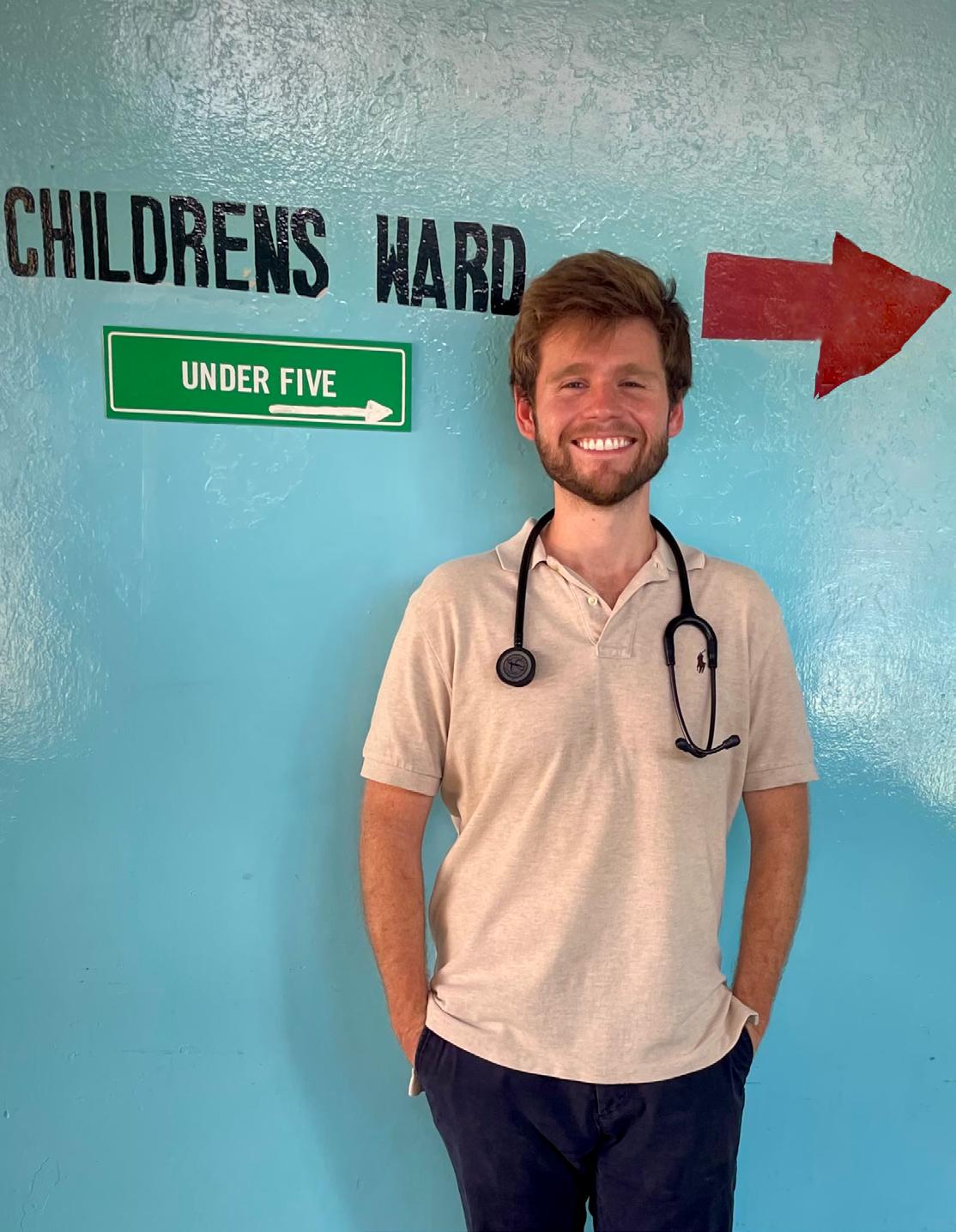
My month was divided into multiple mini-rotations: the general medical wards, the malnutrition unit, and the resuscitation bay. As a medical student, the idea was to give me wide exposure so I could hopefully return later, as a full physician, and be prepared. Given the stark difference in resources between the United States and Malawi, delivery of care and the practice of medicine is inherently different. Malawi is in the bottom-five lowest annual GDPs in the world. As a result, gaps in care are prevalent and there is an unfortunate reliance on international providers. During my time, for example, about half of the total pediatricians were American, British, or Spanish.
Each week was quite the undertaking. The month progressed from the least severe to most medically-intensive patients. I was exposed to patients with a host of diseases, such as malaria, HIV, tuberculosis, leukemia, cholera, malnourishment, and hepatitis, to name a few. Diagnostic and treatment options are exceptionally limited. For example, there is one CT scanner for hundreds of patients (which was broken during my time), there are almost no specialists for pediatric patients, only a handful of lab tests are available, and medication options are quite limited.
10
Tyler’s primary focus is in pediatric medicine.
While my medical sciences learning was quite robust, the knowledge gained regarding health systems, international aid, and Malawian culture was equally fruitful. Global health is a tricky topic, particularly regarding ethics. Like many sociopolitical matters, the complexities of global health are deep. Traveling to Malawi and being immersed in a hospital has only made this more complex for my thinking. In the simplest terms, it’s clear the history of colonialism is of extreme fault. Now, to “fix” history and the repercussions has become extremely challenging to navigate. What is clearer to me than ever is the necessity to engage in these matters from many angles. From reading to talking to folks both domestically and abroad, I feel more and more competent on the matter. But there’s still tons to learn, and my travels to Malawi have only solidified that medicine is truly “lifelong learning.”
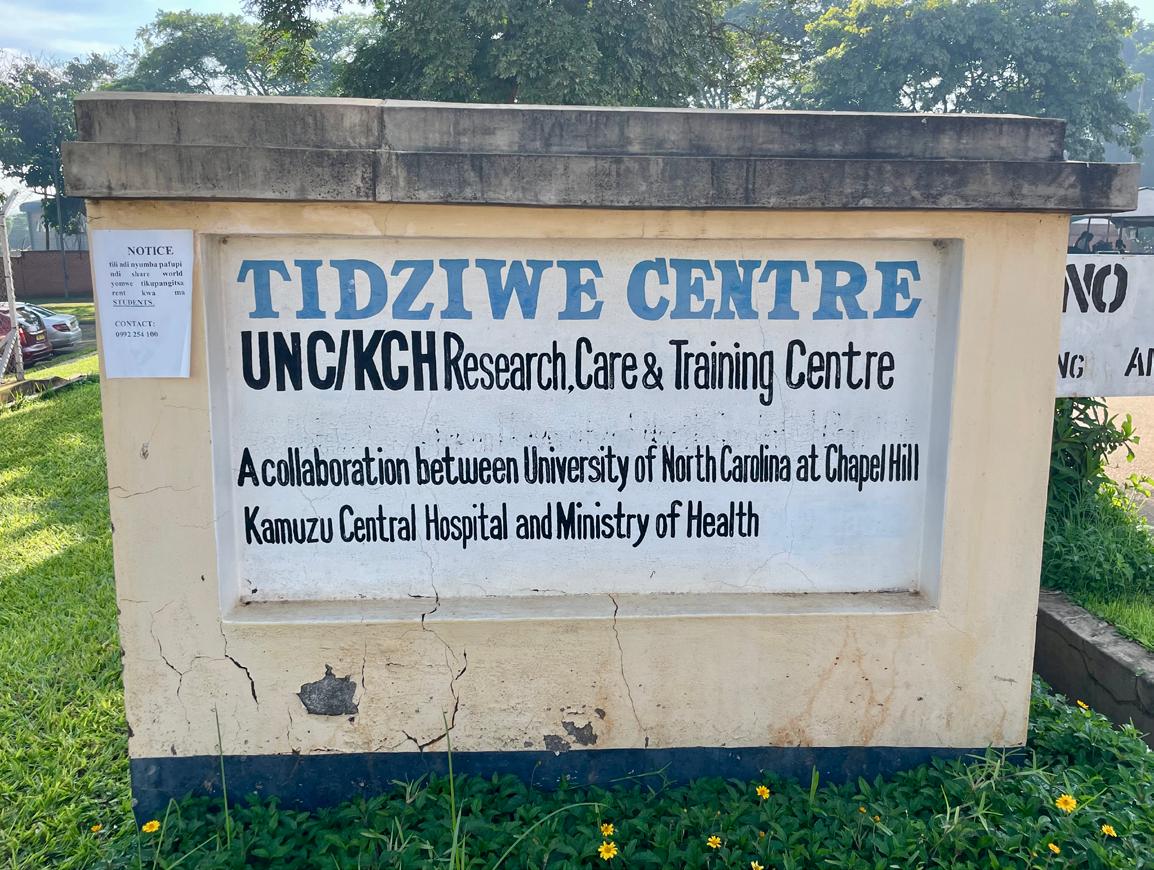
Going abroad makes the learning much richer. Malawi is known as the “Warm Heart of Africa.” The people of Malawi are simply that: warm-hearted. Everywhere I went, I felt welcomed. Folks loved to engage in conversation, whether it be about Malawi, the Chichewan language, the hippos of Lake Malawi, or if I had tried nsima, the staple food of Malawi, yet. The smiles and free-spirit nature of Malawians was encouraging, particularly during the tough days I had in the hospital.
As I see forward, I am sitting with a weird set of emotions. I left Malawi feeling defeated. The depths of problems and realizations of poverty were troublesome to experience and cannot be clearly summarized into words. While I wish this piece or a book could detail them, the way poverty trickles into every aspect of life cannot be easily communicated. The more I’m removed from the trip, the more I can reflect without the raw emotions. Now, as I head off to residency in pediatrics at Children’s National Hospital in Washington, D.C., I am trying to feel motivated once again. I went into medical school fueled by the inequities of our country and world – and I am aiming to garner this back as I begin to treat babies, children, and young adults.
As always, I am thankful for the opportunities I’ve been afforded by the Levine Scholars Program. The experiences I had as a Levine haven’t left my memories; rather, they have molded who I am today and influenced the future I plan to have. I encourage all young scholars to go abroad – maybe even three times as I did. To travel with the intention of learning and service in areas less frequently traveled, such as China and South Africa, is an opportunity one cannot miss.

11
UNC’s partnership with Malawi’s largest hospital is longstanding.
Kayaking in gorgeous waters is a nice break from treating patients.
Alternative Spring Break in Maryville
by Allie Grice ‘26
Late this February, a group of scholars embarked on a journey to rural eastern Tennessee. The town of Maryville (pronounced Mer-A-Vull) welcomed us with open arms. It was not the rural town we had been expecting. Seated less than an hour outside of Knoxville, this is a suburban area with a population of about 30,000. We split our time in Maryville between Habitat for Humanity Build Sites and working in the Habitat for Humanity Restore.
Alternative Spring Break is a great experience for scholars to come together, volunteer, and get to know members of the other cohort years. It is also amazing to be able to see other parts of the country. While in Maryville, we tried several local restaurants, including Jaboni’s Pizzeria, which I would highly recommend to anyone passing through. We also took a day off to visit Knoxville. Knoxville has a beautiful downtown area, accompanied by many historic buildings and plaques of the events that took place there.
Another highlight of the trip for me was the ability to cook dinner for everyone with two of my fellow scholars. After a day of working out on a build site, our cook group decided to make tacos for dinner. With fresh guacamole and pico de gallo, these chicken tacos warranted a table that ate in complete, blissful silence. It was also lovely to be able to eat the food cooked by other scholars on the trip. One night there was a delicious rice and chickpea dish and the next night there was a cheesy pasta with garlic bread. Since a lot of the scholars on this trip were first-years, this food was a big step up from what we cooked for each other at NOLS, now with access to an oven and fresh ingredients.
On the first day of working in the Habitat ReStore, it was evident that this southern community had very traditional values. They immediately made it a point that the men were to do the “heavy lifting” and bring in furniture and the women were to stay inside and sort the clothing donations. No one complained about this, as we were their guests, and were there to do any jobs they needed help with. After a day spent in the Restore, we got back in the van and headed back to the Maryville Church of Christ, where they so graciously accommodated us. Fit with a full basketball court, ping pong, air hockey, a weight room and TV, this space was very nice and kept us all busy on our time away from volunteering.
The next time we worked in the Restore, we divided ourselves into groups. This time I decided to help accept donations. At first, they treated me as if I were very fragile, only handing me pillows from couches and smaller items. Eventually, they began to realize that even though I was a woman, I could lift furniture as well.
On the days where we went to the build sites, we helped put in a foundation of a shed. This meant a lot of hammering needed to be done. A group of us all sat and hammered in a row of nails once a board was in place. In fact, teamwork is one of the biggest takeaways from Alternative Spring Break. When we shoveled dirt, we had a few shovelers and a few people manning the wheelbarrows. When we worked with vents under the house, some were in the crawl space and some were outside guiding them. When one person cooked, another cleaned. This aspect of working together makes me thankful for my fellow scholars, and proud to be a part of a program that stresses both civic engagement and interpersonal relationships.
12


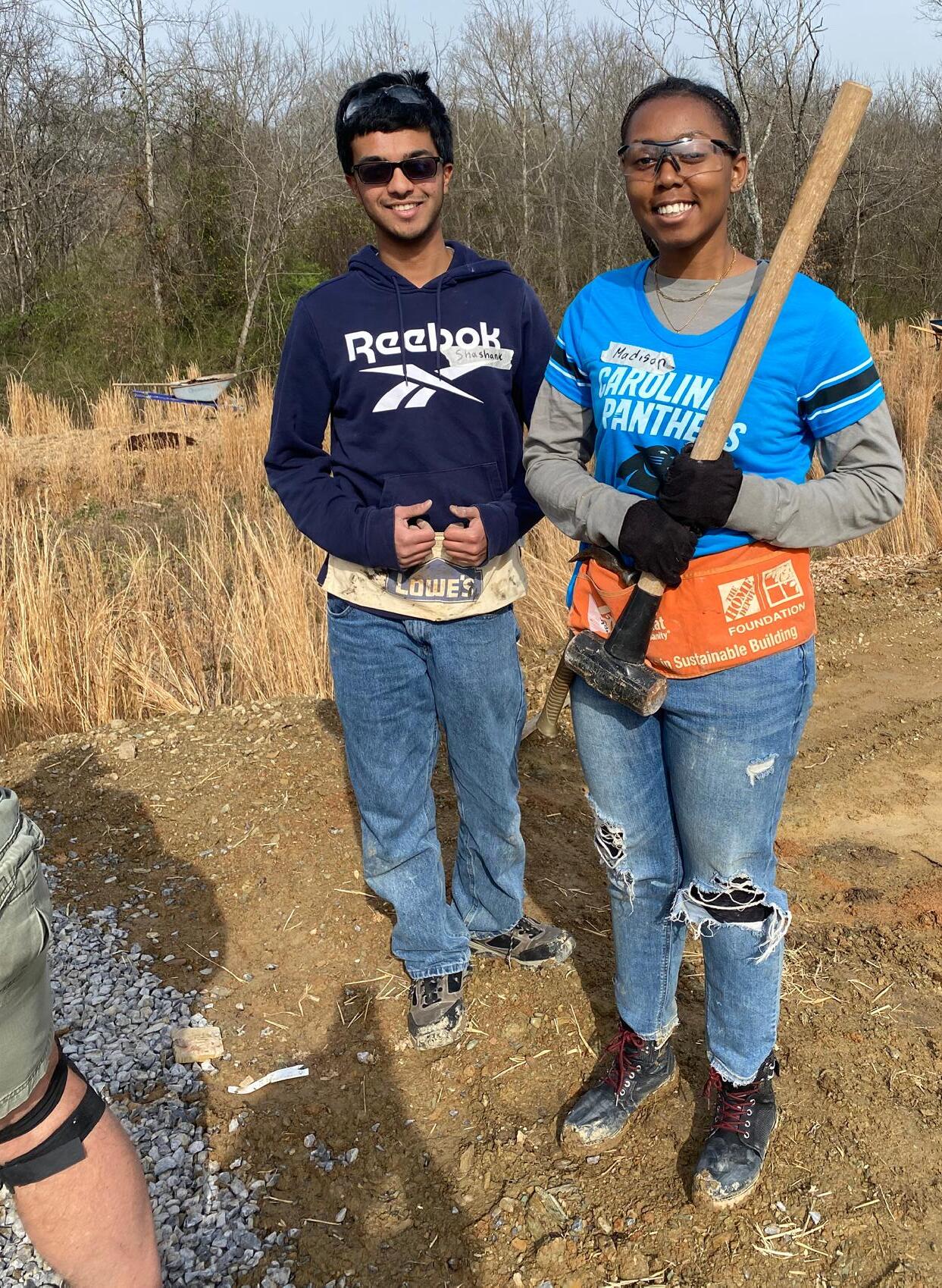

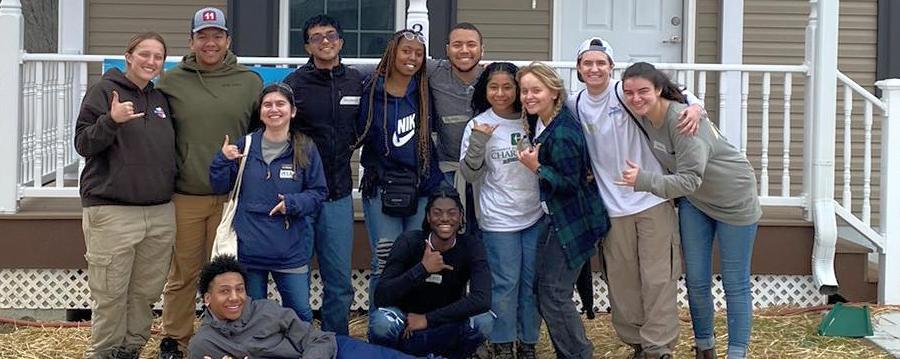
13
Campus Tours en Español:
Initial Ideas to Impactful Initiatives
by Cooper Manley ‘23
“You have a tour guide personality” is something I was told a good bit growing up. I believe it’s meant as a compliment (most of the time), but more than that I knew it was undeniably true. I’m often unbelievably extroverted, unreasonably energetic, and unwaveringly certain that what I believe is great, is great. I know this about myself, for better or for worse, and rather than fight these traits or shy away from them, I leaned into them and became a campus tour guide in Fall of 2019. At first, I was just hoping to share my newfound love for the university with whoever would listen. I had no idea at the time, but that decision was going to lead me to one of the most impactful experiences of my entire college career.
When I applied to become a Niner Guide, I very explicitly remember the application asking about other languages the applicant speaks. It was then, before I had even been accepted into the program, that I first envisioned giving a campus tour in Spanish. By that point, I had been studying the language for several years, and considered myself “academically fluent,” but I wasn’t confident enough yet to call myself fully fluent. Still, my uncontrollable daydreaming led me to believe that one day I would be an upperclassman Niner Guide switching between English and Spanish to provide the best experience possible for prospective students and their families, and that idea lit a fire in me. As if I wasn’t already itching to apply, I got even more excited and made sure to mention in my interview that I was more than willing to work in Spanish. I was told that the language question on the application was more of a formality, but they would definitely keep it in mind if the need ever arose. I was selected to join that semester’s training class, and I was immediately enthralled by all things Admissions and recruitment.
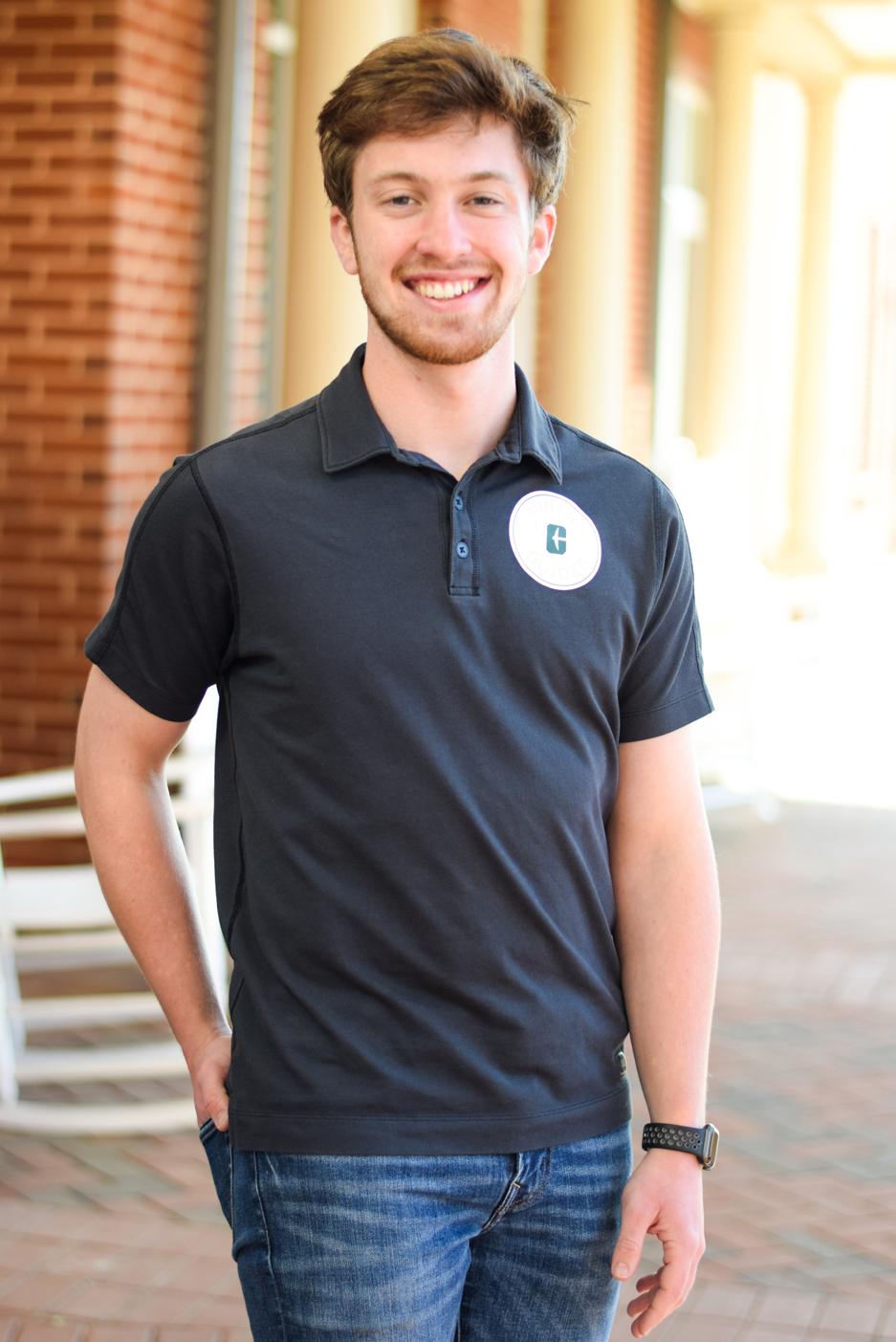
I’ve been a volunteer Niner Guide for a few years now, and in that time I’ve had the privilege of seeing just how impactful a simple campus visit can be to prospective students and their families. A few times, I had families on tour with parents that primarily spoke Spanish and relied on their child to interpret the information for them. While we weren’t offering any official services in Spanish at the time, I would try to muster up the confidence and speak to that family on the side as I led them to the next stop and let them know they could ask me any question in Spanish if that was more accessible for them. This simple interaction would make all the difference in the comfortability and engagement of the entire family, and noticeably removed the sole responsibility from the student who was interpreting. While they might not all have launched into a hundred questions when I told them I spoke Spanish, there was certainly a different energy and excitement about their experience. This feeling stuck with me, and was a similar feeling to what I’ve experienced in other settings for years; when you can speak to someone in their native language, you give them the opportunity to interact to the extent they would like to, not just to the extent they are capable of. The concept of language as a bridge has been apparent since I started my language learning journey many years ago – it’s what I wrote my Common Application essay about, it’s the foundation for a great deal of what I study and am interested in, and it’s what drives me to continue to travel and improve my language. In December of 2021 I completed UNC Charlotte’s Undergraduate Certificate in Spanish-English Translation, and in March of 2022 I was fortunate enough to spend a semester abroad in Montevideo, Uruguay. These opportunities strengthened my Spanish immeasurably, and gave me the confidence to utilize those skills in more formal and professional settings. Now I just had to find those settings, or as it turns out, create them.
FUN FACT:
UNC Charlotte is the #1 producer of Latinx graduates in North Carolina
14
The Gage Undergraduate Admissions Center opened in 2019.
When I returned from my semester abroad, I had about four weeks before the start of the semester, and I knew that I wanted to find something to do in the meantime. In my time away from most of my campus obligations and responsibilities, I found a renewed energy for some of the things I cared about most, my work with Undergraduate Admissions included. So a couple months prior, in an interview for the Niner Guide Trainer position, I asked my supervisor what she thought about offering Spanish-language visit experiences at the university, and discussed how I could help build that program. I hadn’t necessarily planned to propose it at that time, but the idea came back to me and I saw an opportunity to combine my interests and skills to make an impact however I could. After getting some initial approvals from administration, my supervisor agreed to take me on in a new, temporary position for the summer to begin translating the tour materials. I finished those translation projects by the beginning of the school year, and from there began working closely with other Admissions staff to implement this project in the most impactful, sustainable, and ethical way possible. Throughout the whole process, I’ve made a point to clarify what my skills and experiences allow me to contribute, and where I need additional support and perspectives. After a lot of input from native and heritage speakers, we finalized the tour translation and began working on other materials, such as the admissions information presentation and brochure. At our Open House event in October of 2022, two professional staff members and five Niner Guides offered the University’s first ever Spanish-language tour catered towards Hispanic and Latino families. The test run was a success, and after some additional planning and preparation, I’m proud to share that UNC Charlotte began regularly offering Spanish campus visit experiences in January of 2023.
That same January, I had the opportunity to travel to the CIVSA Student Development Institute in Denver, Colorado and present to representatives from numerous other universities’ visit programs on how I brought this project to life at my university, and how they could do the same. I was awarded at the conference for my work on the presentation, and it was there I had a moment of deep gratitude. I’m very grateful to my supervisors and coworkers who believed in me and trusted me to lead the initiative, especially as a part-time student worker, and supported me throughout the process. After a little more reflection, I realized that I’m also eternally grateful for that freshman-year version of myself with the uncontrollable daydreaming. While I sometimes wish I could tame that characteristic, I am more and more aware of how powerful ideas can be, even (and sometimes especially) if they’re born from juvenile excitement or naïvety. More importantly, I’ve learned that combining those ideas with one’s skills and strengths opens up some of the most meaningful and genuine opportunities to serve an individual, organization, or even community.
Cooper is not the only Levine Scholar Niner Guide - this year we have ten!
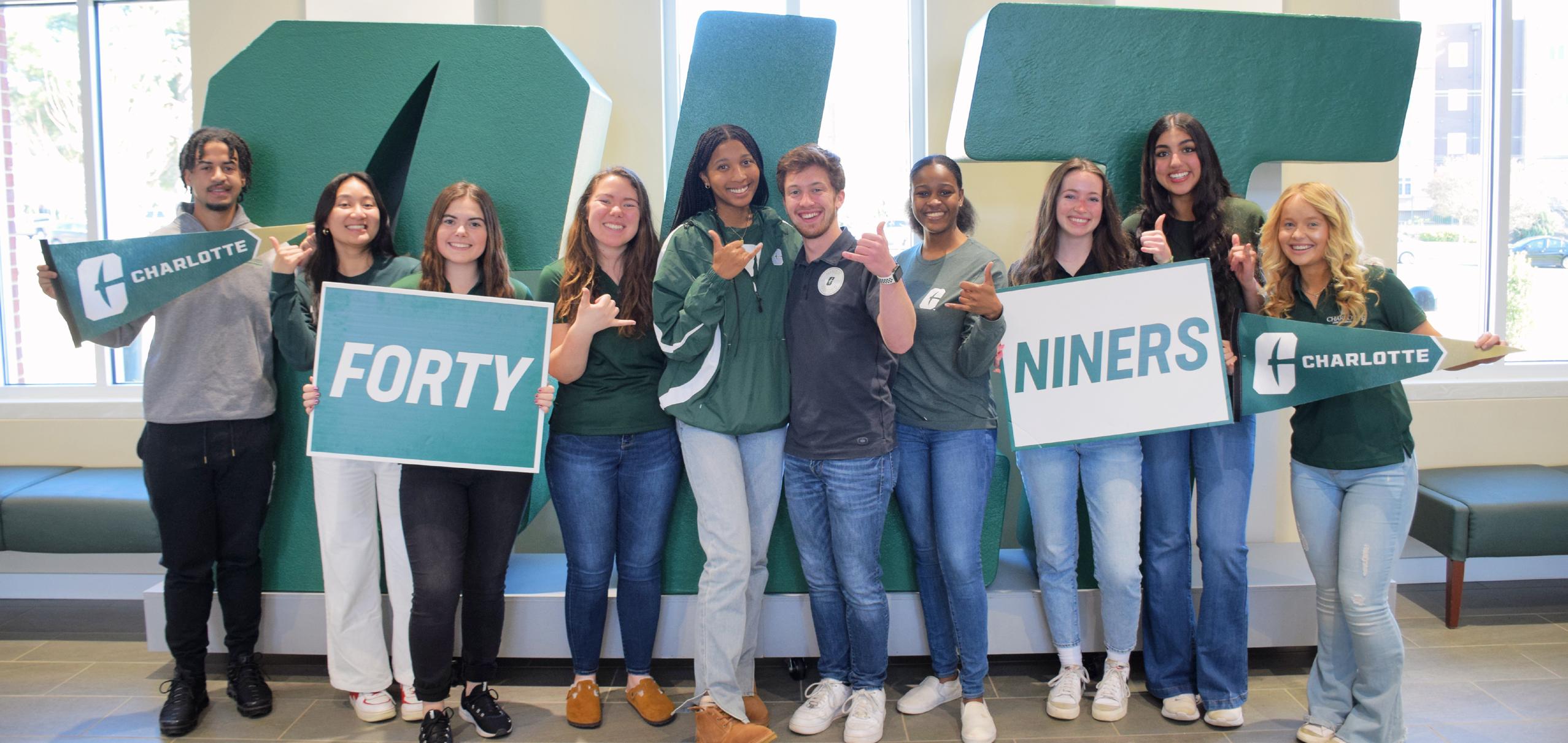
15
The Levine Scholars Program
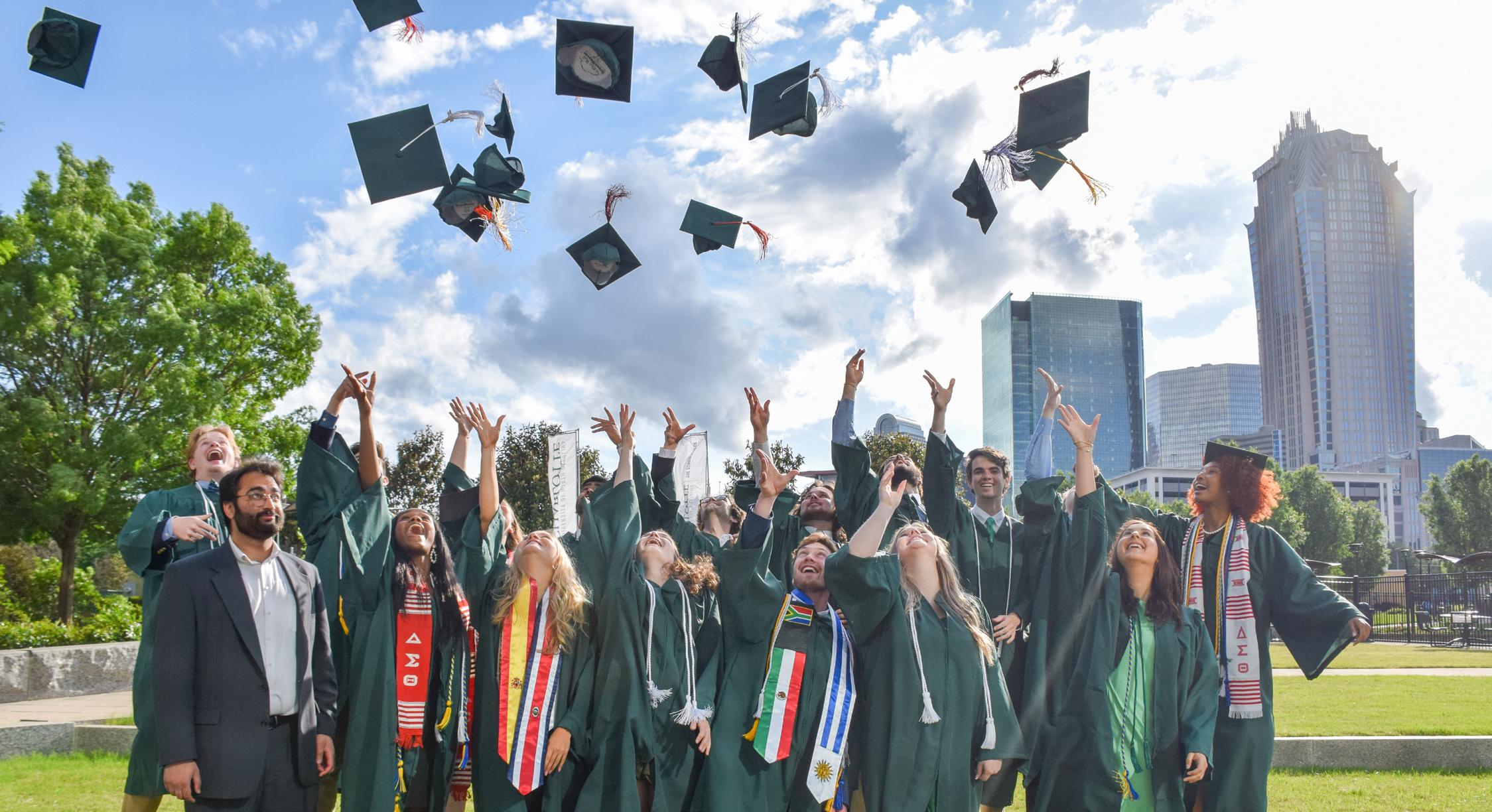
9201 University City Boulevard
Charlotte, NC 28223
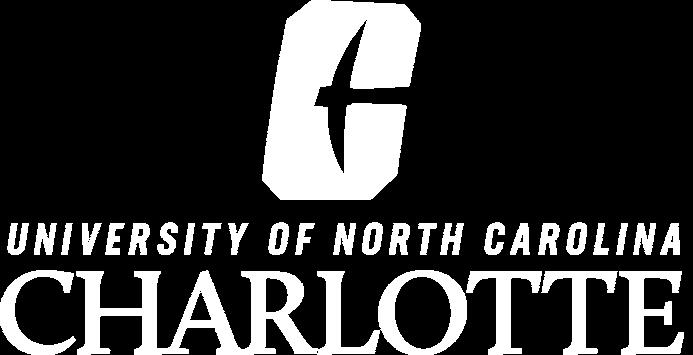
levinescholars.charlotte.edu
704-687-5880
The Levine Scholars Program is a four-year scholarship that includes full tuition, room, board and four summer experiences, including study abroad, which will develop leadership skills and social awareness. In 2010, the inaugural class of Levine Scholars enrolled at UNC Charlotte and approximately 20 scholarships are awarded to high school seniors every year. The Levine Scholarship is valued at $105,000 for in-state students and $155,000 for out-of-state students over four years.
Levine Scholars are talented high school seniors from across the United States whose accomplishments epitomize the values of philanthropists Sandra and Leon Levine, including a demonstrated commitment to community service, intellectual curiosity and the capacity for ethical leadership. Through community engagement, mentoring relationships with civic and business leaders in Charlotte, and a rigorous academic program, Levine Scholars develop the characteristics necessary to produce positive change in the communities in which they live and work. Scholars are able to turn their community service interest into actions with community service grants of $8,000 to support their work in the community. It is this unique connection to Charlotte – its resources, leaders and challenges – that differentiates this program from other scholarships of its kind. The program is specifically designed to expose Levine Scholars to the urban culture of a thriving city and to engage them in service to address needs of the citizens of Charlotte.
16




 by Amogh Bandekar ‘23
by Amogh Bandekar ‘23







 by Mia Nguyen ‘24
by Mia Nguyen ‘24




 by Ariah Brown ‘23 and Cole Jones ‘23
by Ariah Brown ‘23 and Cole Jones ‘23


 by Liliahna Bedolla ‘25
by Liliahna Bedolla ‘25












